Quick facts about oesophageal cancer
The oesophagus is the tube that transports food from your throat to your stomach to be digested. There are three layers of the oesophageal wall, which include the mucosa (made up of squamous cells), submucosa and muscle layer (muscularis propria), in addition to the outer covering (adventitia)
Most oesophageal cancers begin in the lower section of the oesophagus
Each year, there are around 9,400 new oesophageal cancer cases in the UK. Oesophageal cancer is the 14th most common cancer in the UK.
Types of oesophageal cancer
The two most common types of oesophageal cancer are:
-
Oesophageal adenocarcinoma
Cancer that develops in the glandular cells which line the oesophagus. This type of cancer typically forms in the lower section of the oesophagus.
-
Oesophageal squamous cell carcinoma
Cancer that begins in squamous cells that line the oesophagus. This often develops in the middle and upper part of the oesophagus.
Other types of oesophageal cancer include small cell carcinoma, lymphoma, neuroendocrine tumours and gastrointestinal stromal tumours.
Signs and symptoms of oesophageal cancer
As signs and symptoms for oesophageal cancer can be similar to other common conditions, it’s important to see your GP or healthcare professional if you experience any of the symptoms below. Discussing anything concerning with your doctor as soon as possible can help give you peace of mind and offer the best chance of successful treatment if you receive an oesophageal cancer diagnosis.
Oesophageal cancer can be difficult to detect as there are often no symptoms during the early stages. However, as the disease progresses symptoms may include:

Pain or difficulty swallowing such as a feeling of choking when swallowing

Heartburn

Vomiting blood

Black or bloody stools

Unexplained fatigue

Discomfort in the upper abdomen particularly when eating

Weight loss

Coughing or hoarseness
Stages of oesophageal cancer
The TNM system is used to stage oesophageal cancer, and it helps doctors understand what your cancer looks like. The TNM stands for:
Tumour – The extent to which the tumour infiltrates into surrounding tissue
Node – Is a measure of surrounding lymph nodes involvement
Metastasis – Describes whether or not the cancer has spread to other parts of the body
The TNM information, along with other tests, helps determine the stage of your oesophageal cancer using the guidelines below:
-
Stage 0
The cancer is only in the top layer of the oesophageal lining (epithelium) and has not spread to deeper layers of the oesophagus.
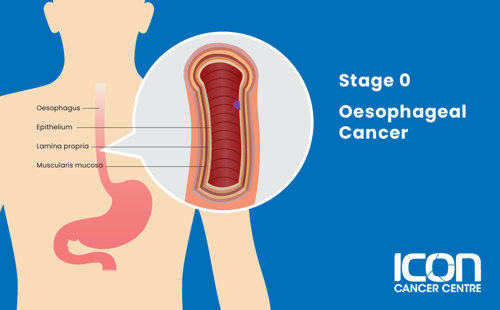
-
Stage I
The cancer has grown into the mucosa, submucosa or muscle layer (muscularis propria).
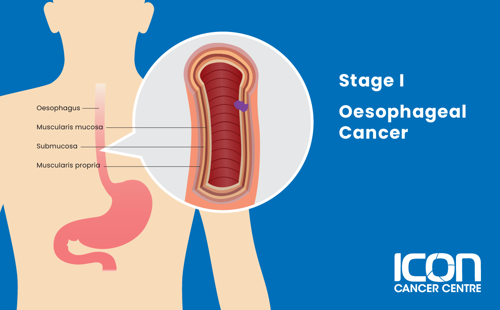
-
Stage II
The cancer has spread to the muscularis propria or outer layer of the oesophagus (adventitia). Alternatively, the cancer has grown into the mucosa or submucosa and has spread to one or two nearby lymph nodes.
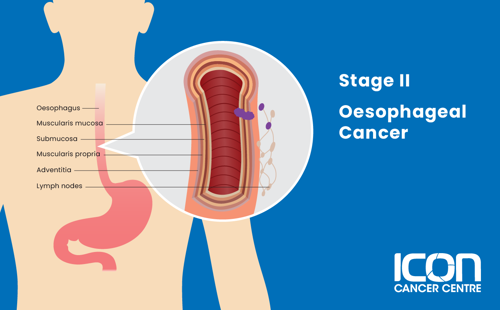
-
Stage III
The cancer has spread to the mucosa, submucosa, adventitia or muscularis propria and no more than six nearby lymph nodes. Alternatively, the cancer has grown into the pleura, pericardium or diaphragm and no more than two nearby lymph nodes.
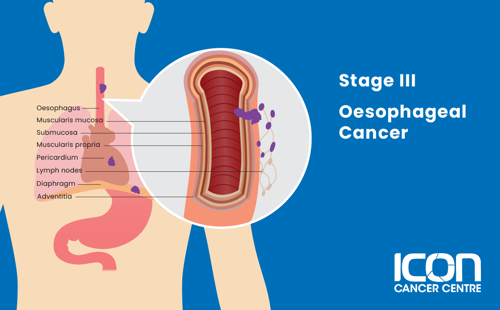
-
Stage IV
The cancer has spread beyond the oesophageal wall to nearby lymph nodes and parts of the body such as the pleura, pericardium, diaphragm, trachea, aorta and spine, or throughout the body to distant lymph nodes and/or organs such as the liver or lungs.
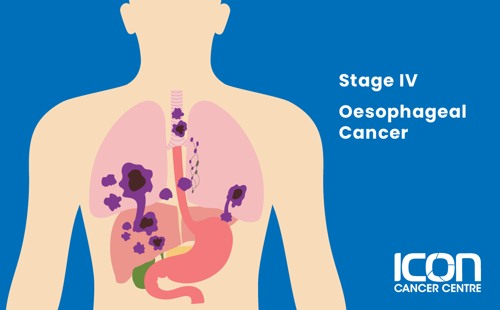
Treatment for oesophageal cancer
There are many different types of treatment for oesophageal cancer. Your treatment will depend on you and your cancer.




